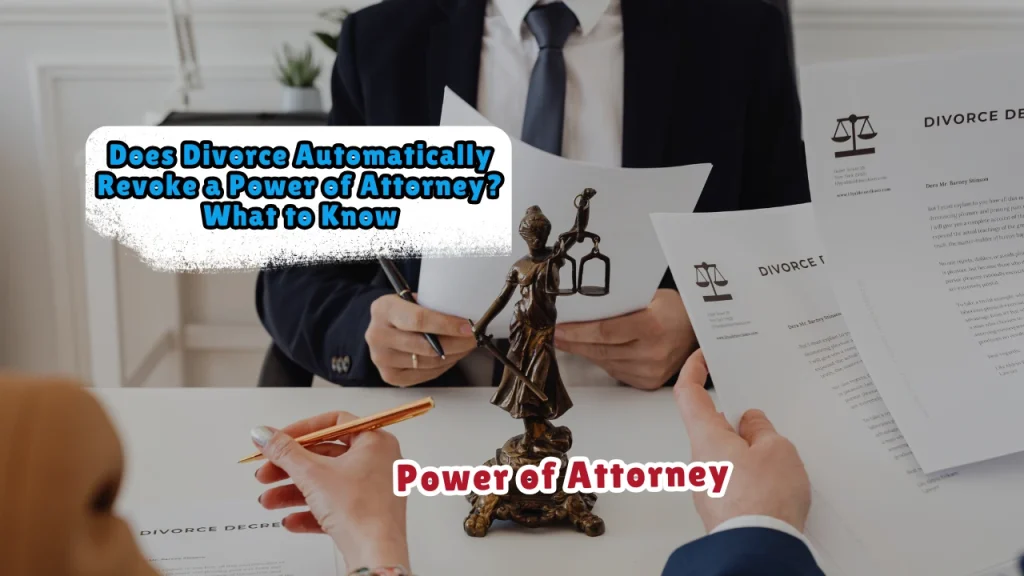Does Divorce Automatically Revoke a Power of Attorney? What to Know
In most U.S. states, divorce does NOT automatically revoke a Power of Attorney (POA) naming an ex-spouse as the agent. However, some states (like California and Texas) have laws that terminate certain POA rights for ex-spouses after divorce. To fully protect your interests, you should revoke the POA in writing and update your legal documents.
Table of Contents
How Divorce Affects a Power of Attorney: State Laws
A Power of Attorney (POA) grants someone legal authority to manage your finances, property, or healthcare. When you divorce, the law treats your ex-spouse as a legal stranger in many cases—but POA rules vary by state:
- States Where Divorce Revokes a POA
- California: Under Probate Code §4152, divorce or annulment automatically revokes a POA granted to a former spouse unless the document explicitly states otherwise.
- Texas: Similar laws (Texas Estates Code §751.132) revoke ex-spouses’ authority for financial POAs.
- Florida, Ohio, and Illinois also have statutes invalidating ex-spouse POAs post-divorce.
- Example: A 2021 California court case (Estate of Collins) ruled that a divorced ex-husband could no longer act as his former wife’s agent under her POA, even though she had dementia.
- States Where Divorce Does NOT Revoke a POA
In states like New York and Georgia, divorce does not automatically cancel a POA. Your ex-spouse could legally retain access to your bank accounts, property, or medical decisions unless you formally revoke the document.
Key Takeaway:
Check your state’s laws (e.g., your local court website) or consult an attorney. Never assume divorce cancels a POA.
Exceptions: When an Ex-Spouse Might Keep POA Rights
Even in states where divorce revokes a POA, exceptions exist:
- Durable POAs for Healthcare: Documents like a Healthcare Proxy or Living Will may remain valid if they don’t mention divorce.
- Specific POA Language: If your POA states, “This document remains valid even if I divorce my agent,” courts may uphold it.
- Uncontested Divorces: If you reconcile informally but never legally finalize the divorce, the POA stays active.
Risks of Not Revoking a POA After Divorce
Failing to revoke a POA can lead to:
- Financial Exploitation: An ex-spouse could drain bank accounts, sell property, or take out loans in your name.
- Medical Decisions: They might make healthcare choices against your wishes.
- Legal Battles: Family members may need to petition the court to terminate the POA, costing time and money.
Real-Life Example:
In 2020, a Michigan man discovered his ex-wife used an old POA to withdraw $80,000 from his retirement account years after their divorce. Because Michigan doesn’t auto-revoke POAs post-divorce, he had to sue to recover the funds.
Related article for you:
Can a Power of Attorney Take Money for Personal Use?

How to Protect Yourself: 4 Steps to Take
- Revoke the POA in Writing
- Draft a Revocation of Power of Attorney letter stating, “I hereby terminate all authority granted to [Ex-Spouse’s Name] under the POA dated [Date].”
- Sign it in front of a notary and send copies to banks, doctors, and relevant institutions.
- Create a New POA
Appoint a trusted family member, friend, or advisor as your new agent. Specify whether the POA is durable (stays valid if you’re incapacitated) or springing (activates only under certain conditions). - Notify Key Parties
Provide your revocation letter to:- Banks and financial advisors
- Healthcare providers
- Insurance companies
- Mortgage or property managers
- Update Estate Planning Documents
Review and revise your will, trusts, and beneficiary designations (e.g., life insurance) to remove your ex-spouse.
Quotes from Legal Experts
“Clients often forget that a divorce decree doesn’t automatically update their POA. Always revoke old documents to prevent devastating financial consequences.”
— Mark Anderson, Family Law Attorney (Cited in Forbes Legal, 2023).
“In states without auto-revocation laws, an ex-spouse could still control your finances years after the divorce. Protect yourself—don’t wait.”
— Emily Torres, Estate Planning Expert, American Bar Association.
Government Resources
- California Courts: Revocation of POA Form
- Texas Law Help: Sample POA Termination Letter
- Consumer Financial Protection Bureau (CFPB): Guide to Financial POAs
Final Checklist
- Confirm your state’s POA revocation laws.
- Revoke the old POA in writing and notarize it.
- Share the revocation with financial/medical providers.
- Appoint a new agent you trust.
Bottom Line
Divorce typically severs the special legal relationship between a principal and their spouse‑agent under a POA, but the effect varies by state and applies only to spouse‑agents. Agents unrelated to the principal remain in place, and third parties acting without knowledge of the divorce are shielded from liability. To ensure clarity and prevent unauthorized actions, principals should formally revoke outdated POAs, promptly create new documents, and inform all relevant institutions once their marriage ends.
About the Author

Sarah Klein, JD, is an experienced estate planning attorney who has helped clients with wills, trusts, powers of attorney, and probate matters. At All About Lawyer, she simplifies complex estate laws so families can protect their assets, plan ahead, and avoid legal headaches during life’s most sensitive moments.
Read more about Sarah
